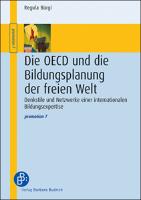Die OECD und die Bildungsplanung der freien Welt
Denkstile und Netzwerke einer internationalen Bildungsexpertise
Abstract
Durch Instrumente wie PISA erlangte und erhielt die OECD die Autorität, über Erfolg und Scheitern nationalstaatlicher Bildungspolitiken zu urteilen. Regula Bürgi beleuchtet aus historischer Perspektive die Denkstile und Netzwerke, mittels derer diese internationale – vornehmlich wirtschaftspolitische – Organisation zu einer Bildungsexpertin avancieren konnte. Basierend auf vielfältigem Quellenmaterial dringt die Autorin in das Räderwerk der Organisation vor und identifiziert Schlüsseleigenschaften des OECD-Erfolgs.; Instruments such as PISA have given OECD the authority to judge relative successes and failures of national education policies. Regula Bürgi examines from an historical perspective the thinking styles and networks by means of which this international - primarily economic-political - organization could advance to become an expert in the field of education. Based on diverse source materials, the author penetrates the architecture of the organization and identifies key characteristics of OECD's success.
Keywords
Educational administration & organizationDOI
10.2307/j.ctvddzx13ISBN
9783847405573OCN
1135848907Publisher
Verlag Barbara BudrichPublisher website
https://budrich.eu/Publication date and place
Leverkusen-Opladen, 2017Series
promotion, 7Classification
Educational administration and organization


 Download
Download Web Shop
Web Shop